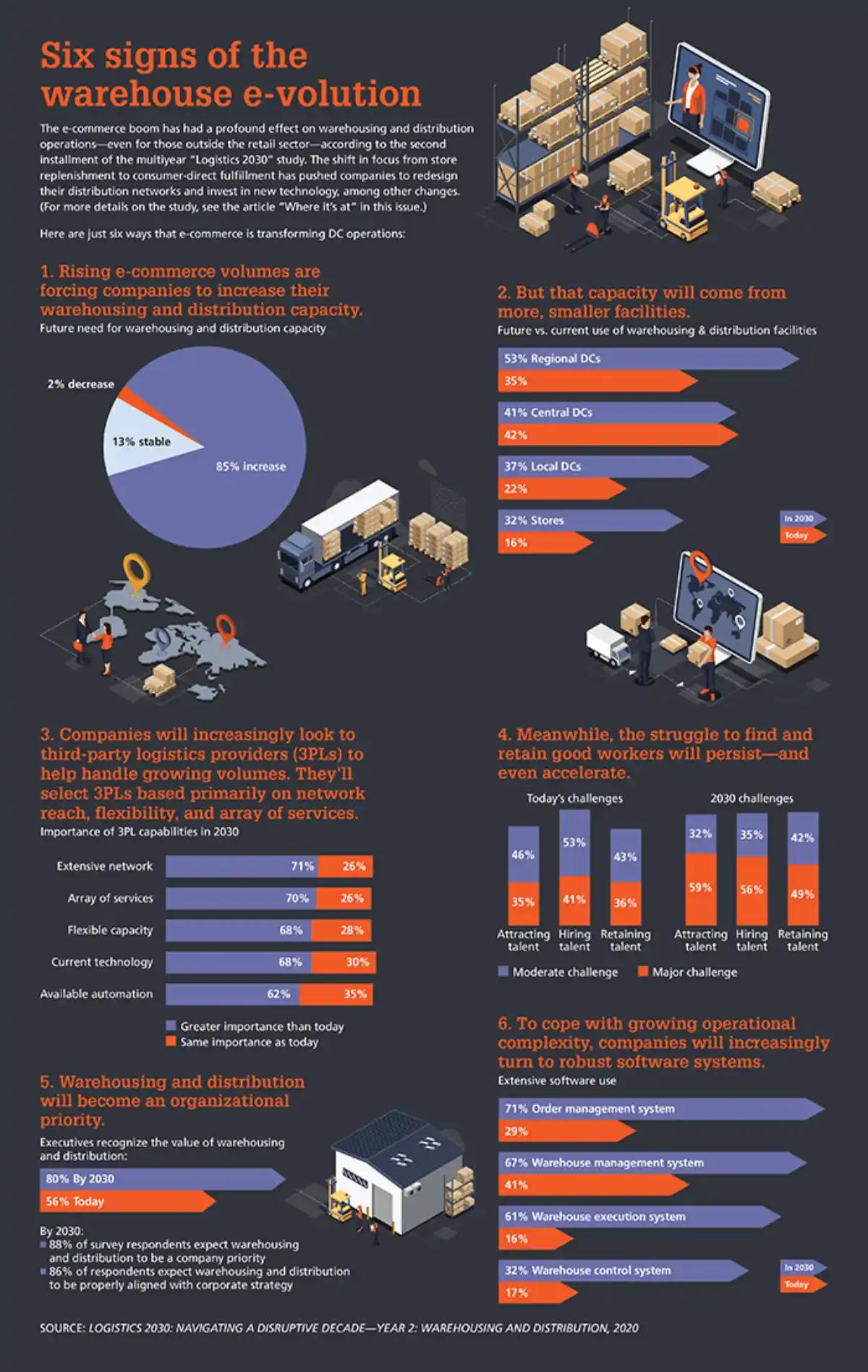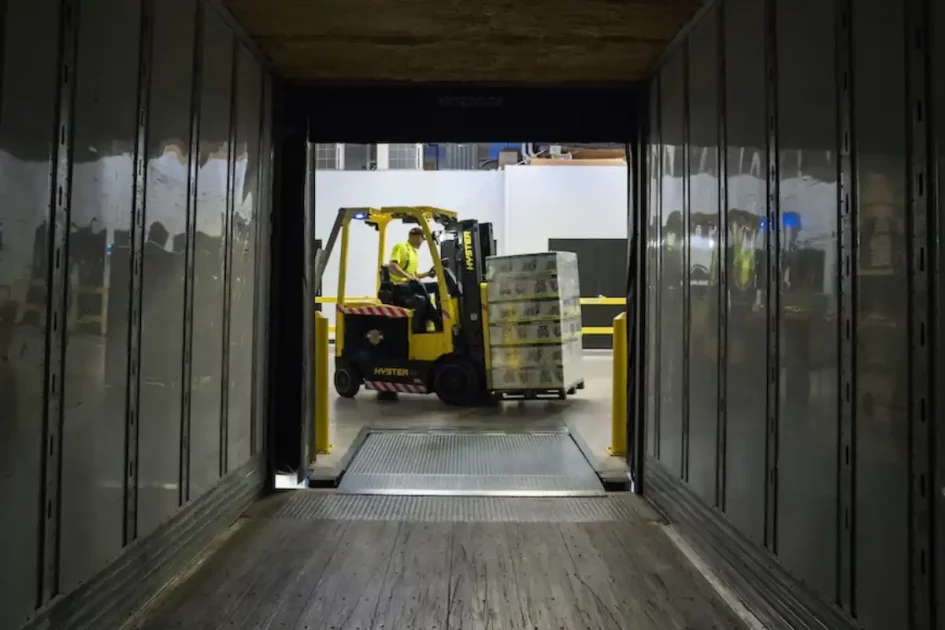MenuMenu
- Compare. Save. Ship.
- Main Menu
- How It Works?
- Shipping Services
- eCommerce
- Learn

Space is always proving to be an issue for small business owners—it starts out in the garage, and then ends up sprawling into the living room and elsewhere. Thankfully, you have options available: ecommerce warehousing is one solution that keeps your customers happy, saves you space, and helps you keep things organized.
The number of ecommerce sales is expected to grow by 10.4% this year, and That number is only expected to continue rising in the years to come. With this projected outlook, it makes sense to understand the ecommerce warehousing and fulfillment options for your business.
And, most importantly, you should understand how these options make a difference for your ecommerce business.
Finding the right ecommerce warehousing option can make running your business streamlined and easier than it’s ever been.
Below we’ll take a look at what ecommerce warehousing is and the different warehousing options.
eCommerce warehousing is the process of managing and storing goods and products sold through online stores. These goods are most often stored in warehouses.
Otherwise, ecommerce warehousing covers everything from how and where you secure products from, monitoring how many products remain on-hand in real-time and how long items have been sitting in storage, and packing and shipping from the warehouse.
How and where goods are stored influences how internal processes for your ecommerce business are achieved. These include processes like inventory management, real time tracking, order packaging, and shipping orders.
These are linked to the ease with which your business operates and customer experience. Better packaging and faster, transparent shipping = happy customers.

When warehousing ecommerce goods, there are several different warehousing options available.
As your business grows, you’ll find that ecommerce home fulfillment warehousing is no longer enough—you’ll need to move your inventory to a proper warehouse. This allows growing businesses to keep up with increased demand for products and storage space.
Being aware of your options before needing them helps keep your business cost-effective. This helps you avoid becoming part of the more than 10% of businesses that operate with cost-ineffective warehousing distribution plans.
The different ecommerce warehousing spaces include:
You can rent storage space to store ecommerce goods. Ecommerce businesses take on warehouse management operations (like fulfilling and shipping orders) themselves when using this warehousing option.
It’s also common that more than one business will rent storage and fulfillment space in the same warehouse.
| Simplify your shipping with these blogs about warehousing and shipping for ecommerce: |
This type of warehouse space is government-owned. They tend to offer a better rate than rented or public warehouses, and offer benefits like cheap storage and safe, clean storage conditions.
Private warehouses are warehouses owned and used by a single business. Often, this is only done by large retailers, such as Walmart and wholesalers.
This type of space requires the business to fulfill all steps of warehouse management. Including order fulfillment, administrative details, and staffing.
Bonded warehouses are places where cross-border ecommerce orders can be stored while waiting to clear customs. These are government-owned warehouses that offer both short and long-term storage for ecommerce orders.
These help businesses selling internationally avoid more fees and fines for not paying duties right away. This is done by providing the business with a “bond,” in other words, by offering proof that they are working with customs to fulfill orders internationally.

Source: Supply Chain Quarterly
Cooperative warehouses are owned by a group of similar businesses or partnered businesses that have joint ecommerce warehousing and fulfillment needs. All the fees are shared by the co-op businesses. This offers warehousing at a more affordable price to the co-op members.
Examples of businesses that use this model include agricultural businesses and fisheries that have similar storage needs for their retail goods.
Smart warehouses are exactly what they sound like—warehouse operations are fulfilled using technology, including warehouse management systems (WMS), smart picking tools, and guided vehicles, just to name a few.
Like a smart home, smart warehouse operations are digitized and require minimal input from a person. These types of warehouses often use AI tools for order fulfillment. While this method of warehousing comes with a host of benefits, the costs are often the biggest obstacle to using them.
Places that use smart warehouses include shipping giants like Amazon.

These types of warehouses bring together orders from multiple businesses and suppliers that are going to be shipped to the same area. By shipping orders from multiple suppliers, they’re able to minimize shipping costs.
Fulfillment centers offer short-term storage for goods and offer the picking and packing of orders. Because they’re designed for the fulfillment of orders more so than warehousing goods, you may need warehouse space in addition to using a fulfillment center.
Third-party logistics providers, or 3PL providers, are warehousing options that offer product storage and also take on inventory management, order fulfillment, and returns. This means that all your warehouse and shipping needs are met by a single provider.
3PL providers easily integrate with ecommerce platforms. If you’re using this model, be sure your provider can integrate with your ecommerce platform.
This model is an option that gives you both time and space back by outsourcing all inventory and shipping-related processes.

How can ecommerce warehousing and fulfillment impact your day-to-day business? eCommerce fulfillment services like these can streamline warehousing and shipping for ecommerce needs that can otherwise slow down your operations and inhibit your ability to scale your business and embrace new opportunities.
77% of businesses are planning on using automated warehousing systems to increase their efficiency and strengthen inventory management and analytics. With the many benefits ecommerce warehousing and fulfillment providers offer businesses, this isn’t a surprise.
The right ecommerce warehousing and fulfillment method can offer you and your business benefits such as:
eCommerce warehousing models offer you the advantage of having storage space specifically designed for ecommerce businesses.
The needs of warehouse needs for ecommerce are different from those of traditional warehouses. Roughly 80% of ecommerce sales only include a single product and the returns rate is higher.
Choosing warehousing options built with these needs in mind supports your business to scale and succeed.
Warehouses are designed to make inventory tracking easier and more accurate. Items are scanned in when they arrive before being sorted and as they are picked, allowing you to keep tabs on your product inventory and availability.
Inventory management allows you to accurately develop inventory analytics and projections that help you plan for busy seasons and how much inventory of each product you want on hand.
Warehousing and shipping for ecommerce from larger warehousing storage spaces allow you to fulfill and ship your orders at both a faster rate and a lower shipping cost.
How does this work? These warehousing spaces are often located in more central hubs for shipping, or your inventory can be stored in multiple places allowing your business to ship closer to your customers.
This is an important factor for your business to address since 70% of shoppers abandon their shopping cart for reasons related to shipping costs and delivery times. Being able to accommodate customer shipping preferences will help you drive more sales and increase customer satisfaction.
With outsourced warehousing, you physically have space to grow with more room to store products and the ability to grow fulfillment operations as needed. Unlike warehousing from home, you’re not restricted in space.
With ecommerce warehousing, you’re setting your business up for easier business operations, long-term growth, and success.
From picking up your packages from your doorstep to absolutely zero volume minimums, we’re Canada’s leading warehousing and shipping partner, trusted by 2,500+ businesses across Canada. We empower small businesses just like yours to save up to 70% on shipping, every time.
Contact us to learn more about how we can support your business, from warehouse to shipping.

Director, Ship Expert
Greg Woo is a seasoned expert in the logistics and distribution industry, with a career spanning over two decades. He has a comprehensive understanding of shipping and distribution needs, and has extensive experience integrating with e-commerce stores as well as customer specific WMS (warehouse management systems) and ERP’s (enterprise resource planning software). His tenure in the industry and established courier and LTL partnerships have allowed clients to benefit from reduced shipping expenses, as well as improved operations through software and specialized integrations.
Greg is currently the Director at Ship Expert Inc., a role he has held since February 2015. Prior to his role at Ship Expert, Greg held significant positions at Juxto, a telecommunications and managed internet service provider.